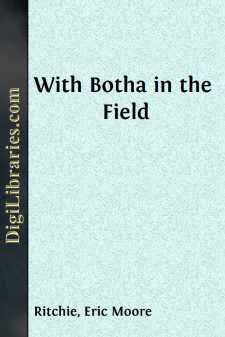Categories
- Antiques & Collectibles 13
- Architecture 36
- Art 48
- Bibles 22
- Biography & Autobiography 813
- Body, Mind & Spirit 142
- Business & Economics 28
- Children's Books 16
- Children's Fiction 13
- Computers 4
- Cooking 94
- Crafts & Hobbies 4
- Drama 346
- Education 46
- Family & Relationships 57
- Fiction 11829
- Games 19
- Gardening 17
- Health & Fitness 34
- History 1377
- House & Home 1
- Humor 147
- Juvenile Fiction 1873
- Juvenile Nonfiction 202
- Language Arts & Disciplines 88
- Law 16
- Literary Collections 686
- Literary Criticism 179
- Mathematics 13
- Medical 41
- Music 40
- Nature 179
- Non-Classifiable 1768
- Performing Arts 7
- Periodicals 1453
- Philosophy 64
- Photography 2
- Poetry 896
- Political Science 203
- Psychology 42
- Reference 154
- Religion 513
- Science 126
- Self-Help 84
- Social Science 81
- Sports & Recreation 34
- Study Aids 3
- Technology & Engineering 59
- Transportation 23
- Travel 463
- True Crime 29
With Botha in the Field
Description:
Excerpt
PART I
SECTION I
Six weeks after the war-cloud smashed over Europe a man called on me. He was an old friend; but the point about him is that at that particular time I fancied him on his farm at least a thousand miles away.
"Hello!" I said in surprise. "Why this sudden appearance?"
"This is going to be a big thing, my boy. I am off 'Home.' They will need us all."
It impressed me. He was a person calm and methodical minded, and, like so many good men, he has been dead now many months. His words, which have proved true, were the first to turn my mind definitely to war- thoughts. Besides, the man whose trade is writing has always, when events are stirring, the itch to go, look and note.
In the branch of the Union Service to which I belong--the South African Police--none but Reservists could then proceed to Europe; but when General Botha announced that he himself would take command of the Expeditionary Force to German South-West Africa, a Bodyguard from the South African Police was decided upon, volunteers came forward, and on this unit I had the honour to serve.
The intention of the Union Authorities was to push forward with the German West Campaign as quickly as possible. The Rebellion delayed operations roughly some three months--a period during which some exceedingly severe marchings and stiff rifle actions took place. I mention this deliberately, for in the stir of well-won applause following the victorious end of the Campaign proper, the preliminary canter of the Rebellion is perhaps somewhat forgotten.
It does not seem, in the light of later information, strictly true to say that the Rebellion of 1914 broke upon the Union of South Africa in a manner wholly unexpected. But its ultimate development and extent did cause both surprise and great uneasiness. The details of its various activities over the country are by this time stale history. Leaving comment of a political nature alone, I confine myself briefly to the movements which, performed by General Botha and the loyalist troops, were so swift and accurate in their workings that they broke the back of the main risings before more than local disorganisation and the least possible amount of bloodshed had been achieved.
On the 12th of October the Bodyguard for the German South-West Campaign assembled for field practices, etc., at Pretoria. On the 20th we heard that we should be leaving at an hour's notice, presumably for the South-West. The following day wild and disquieting rumours began to circulate from early morning. Maritz had gone into rebellion. Motor- cars sped all forenoon between General Botha's house close to us and the Union Defence Headquarters. Our camp was full of alarms. The police of Pretoria became suddenly twice as many about the streets. Towards evening it was positively stated that plots were afoot aiming at nothing less than the life of General Botha; and the Main Guard, which had been mounted at the General's house from the day of the Bodyguard's formation, was doubled....


